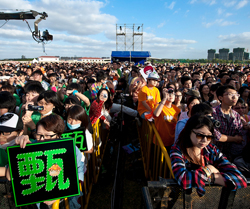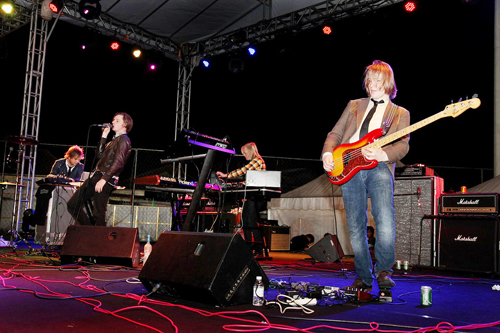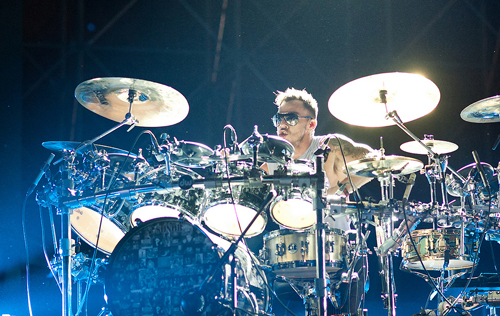
Chilling Their Worries
The Oblivion Tent featured a variety of alternative acts and was well attended throughout the day.
This area was the favorite of Split Works partner and operations manager Nathaniel Davis: “Oblivion was designed to be a bit of an oasis in the midst of the festival scrum. It turned out to be much more than that. The kids who came for Ludacris forgot all about him and ended up chilling their worries away to the much more cerebral dance sounds of Gold Panda and Mount Kimble.”
Finally there was the American cultural export stage, otherwise known as the NBA Street Jam. The Chinese love basketball, and the NBA (U.S.-based National Basketball Association) provided sponsorship for a fantastic hip-hop and rap stage, complete with a full court basketball tournament.
Hip-hop innovator and Rock and Roll Hall of Fame inductee Grandmaster Flash was the anchor at this venue. I had the privilege of listening to about 10 minutes of his show.
This DJ pioneer was nothing short of incredible, and I wish I could have stayed for his entire performance. His audio sounded great, at an appropriate SPL with plenty of natural-sounding reverb tails, indicating to this listener there was well-managed gain structure throughout the signal chain with plenty of headroom left in the PA. The artist effectively self-mixed.
While America has not done so well in the manufacturing export sector of late, the NBA stage demonstrated one classification of product we still export effectively: our culture. The combination of hoops and hip-hop made for a great shared cultural experience for the Chinese audience.
A Dichotomy
It’s always much easier to criticize those who may not have our level of experience when evaluating their performance, but it’s also possible to appreciate and celebrate their accomplishments despite this disparity. I’m fascinated by China and have visited many times. Each time I return I think that experiencing Asia should be a basic cultural requirement for Westerners, primarily to put our own circumstances in perspective.
This was the first opportunity I’ve had to evaluate a live production in China, and it allowed me to recognize what a good job some of the Chinese audio techs are doing despite the cultural and historical differences. I believe that successful sound reinforcement is fundamentally the combination of equal parts artist contribution, professional equipment, and skilled operation, but there exists a dichotomy in China.
While the Chinese can acquire the gear, they are playing catch-up in terms of expertise. If China’s progress in other fields is a template, we can expect them to catch up quickly.
At the Black Rabbit Festival, it was clear that the production companies owned or had access to all the best equipment. Much of the program content was well performed. Remarkably, decent audio was achieved in an environment where the majority of audio engineers were young and had been practicing less than 10 years.

Contrast that to the over 40 years of performance audio experience we collectively share in the West, and you can appreciate this accomplishment. While there were a few native English-speaking advisers on site, and the foreign bands brought their own crews, predominately the results were the product of a team of Chinese audio staff without access to a Full Sail education or the breadth of experience enjoyed by Live Sound International readers.
Further, they performed this work without stage hands, only an untrained labor pool just off a farm or construction site. Imagine assembling large and complicated performance environments with video, digital consoles, and moving lights, but without the luxury of experienced local crews to set and strike.
In the U.S. and Canada we have IATSE. But in China there is no legacy of stagecraft. No pools of competent riggers, stage electricians, or set builders in every city. This puts additional burdens on company technicians when producing an event, and makes the accomplishment of a good sounding festival more significant.
Those who have toured in China appreciate these cultural differences. You understand what lurks just below the surface. Hopefully those who have not been will have an opportunity to visit or work there soon and see it for themselves.
Daniel Abelson worked his first outdoor festival in 1974. Today he a consultant who specializes in the low voltage electronic systems found in professional football and baseball stadiums, and can be reached through www.igscompany.com.

